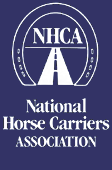The horse hauler you entrust with the transportation of your equine partner is important. Not only do you expect your horse to make it to the destination, but you also expect adequate care during the trip.
Things to remember to get in writing are: how often your horse will be provided hay and water, how many hours will be traveled in between stretch breaks, how many hours per day your horse will be in the trailer, where your horse will layover if there are overnight stays, the size stall the horse will be in for the trip, etc.
Federal Law requires that all persons and/or companies that operate a Commercial motor vehicle, i.e. those that haul horses for a fee or ANY kind of compensation, must have the following:
- Their name, city and state prominently displayed on both sides of their vehicles.
- Their D.O.T. # on the vehicle that is readily legible from a distance of 50 feet.
- A Motor Carrier (M.C.) # which identifies them as an authorized “For Hire” carrier that has insurance on file with the D.O.T.
BEWARE of any hauler who:
- Is unmarked or is placarded with a “Private or “Not for Hire” sign.
- Does not use a bill of lading (a contract that is signed by the shipper and receiver of your horse).
- Requires a deposit prior to shipping.
- Claims that his truck is a “recreational vehicle” and therefore exempt from any and all regulations.
A business that does not operate as a commercial enterprise, or falsely puts forth that they are not engaged in commerce, will not be in compliance with the rules and regulations set by the Federal Motor Carriers Safety
Administration. Their drivers will not be subject to drug and alcohol testing. They will not be required to do any vehicle inspections (pre-trip or roadside inspections by the USDOT). They will not be using logbooks, or be regulated as to the number of hours they can legally drive in a day or A week. They will not be required to carry valid medical cards, or be subject to any of the other regulations set forth by the FMCSA that keep our highways safe.
Make sure your agent or other shipping representative (i.e trainer) is aware of these requirements. You, as the owner of the horse(s), will be held responsible for the actions of your agent. Any incidents or accidents involving an illegal hauler, during the shipment of your horses, could ultimately be your responsibility.
If a hauler is stopped for any traffic violation, and is found to be transporting horses illegally, they will be shut down by the DOT on the spot. This could mean that your horse will be stranded on the side of the road until
other arrangements can be made.
~National Horse Carriers Association
Also, never be afraid to ask for references, and do your due diligence by looking for reviews online before contracting with any horse hauler. Keep these tips in mind when looking for your professional horse hauler, and safe travels!






Leave a Reply
You must be logged in to post a comment.